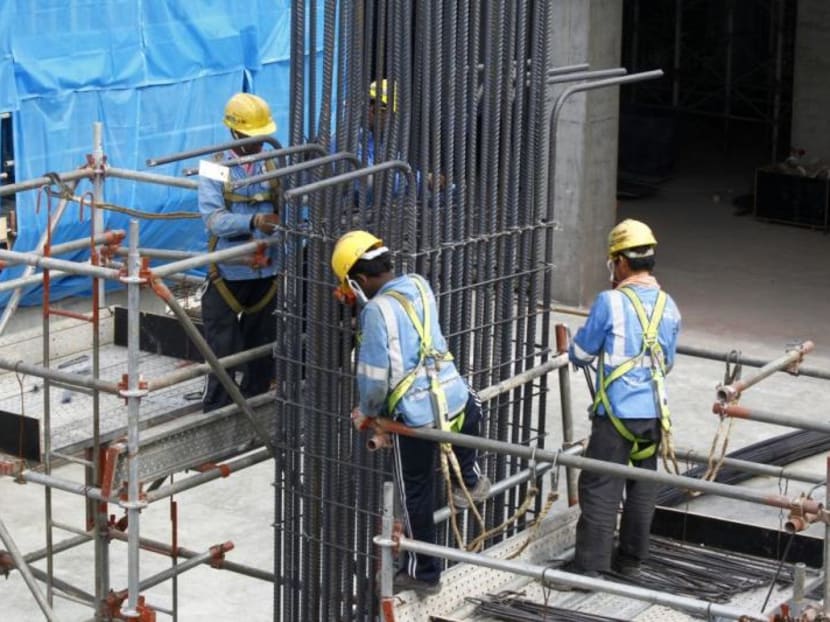S’pore has to reduce reliance on low-wage foreign workers but will always need them: Chan Chun Sing
SINGAPORE — Even as Singapore aims to reduce its reliance on foreign workers for low-skilled jobs, it will still need these workers in sectors such as construction, given the small domestic population and Singaporeans' general unwillingness to take up such jobs, said Trade and Industry Minister Chan Chun Sing on Saturday (May 30).

SINGAPORE — Even as Singapore aims to reduce its reliance on foreign workers for low-skilled jobs, it will still need these workers in sectors such as construction, given the small domestic population and Singaporeans' general unwillingness to take up such jobs, said Trade and Industry Minister Chan Chun Sing on Saturday (May 30).
Speaking to the media in an interview about restarting Singapore’s economy in the wake of the Covid-19 pandemic, he noted that it has been the Government’s position for many years now that the Republic should wean itself off its heavy reliance on low-wage migrant workers in industries such as construction, security and cleaning.
Nonetheless, he added, it would not be possible for Singapore to sustain these industries without bringing in any foreign workers at all.
He was touching on this issue as a debate has emerged in recent weeks over the matter. The explosion of Covid-19 cases in foreign worker dormitories has sparked calls by some for Singapore to reduce its population of migrant workers.
But business leaders have hit back at such calls, saying such a move would have a negative impact on the economy.
Mr Chan noted that in the past several years, the Government has encouraged companies to rethink their processes so as to be less reliant on labour. For example, construction firms have been urged to adopt prefab technology, which allows them to construct a building with fewer workers.
Singaporeans changing their habits by cleaning up after themselves and caring more for the environment, like the Japanese, may also help reduce reliance on cleaners, he said.
Nonetheless, Singapore will always need foreign workers, he said, when asked why other countries have been able to reduce their reliance on such workers while Singapore has found it hard to.
“The fundamental question is… what proportion of our labor force is prepared to do these sectors’ jobs?” he said.
Mr Chan painted a hypothetical scenario in which 100,000 Singaporeans are working in the construction sector, instead of the current 300,000-strong foreign workforce.
This scenario assumes that the Singaporean workers are three times more productive than foreign workers and are being paid three times more, and that they work for more than 40 years in the sector without quitting.
To realise such a scenario, about 2,500 Singaporeans out of the 33,000 born every year would have to end up working in the construction sector, which translates to about 7.6 per cent of every cohort.
“Do you think we would be able to recruit, from every cohort of Singaporean babies, about 6 to 8 per cent of them into the construction industry, and they'll be three times more productive than foreign workers?” he asked.
“I'm not saying that nobody wants to go into the construction industry. I'm saying that I think (Singaporeans) want a diversity of jobs,” he added.
In countries where locals work in the construction industry themselves, wages in the sector are much higher or construction projects take much longer to complete due to constraints on worker numbers, noted Mr Chan.
“Of course, you might ask me the question, ‘So what’s the big deal, right? So why don't we build slower, why must we build so fast right?’” he asked.
“And then I think the answer to that is quite obvious. For a small country without natural resources, we compete on the basis that we are a good place for people to do business. If we lose out in that relative game compared to other people, then, unfortunately, I think the future of Singapore will not be what we expect it to be.”
The long-term goal to reduce Singapore’s reliance on low-wage foreign workers does not apply to the high-skilled foreigners that the city-state wants to continue attracting, Mr Chan noted.
“We would like to have talented people come to Singapore, start off businesses and create jobs for fellow Singaporeans. We would have liked to have talented individuals to be part of team Singapore rather than competing against Singapore if they were somewhere else.”








